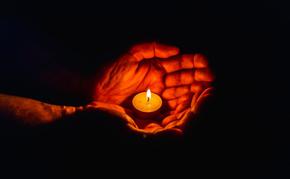The views expressed in our content reflect individual perspectives and do not represent the authoritative views of the Baha'i Faith.
On May 23, 2023, the Baha’i International Community (BIC) issued a call for creative content that could honor ten Baha’i women who were executed by hanging in Iran in 1983. Immediately, I wanted to help.
Called the #OurStoryIsOne campaign, the BIC’s global call for creative efforts was meant to voice support for brave women everywhere around the world who stand up for the principles of justice, truthfulness, and equality at any cost — even their lives.
RELATED: Tahirih: the Great Emancipator of Middle Eastern Women



I didn’t know enough about these ten Baha’i women, so I began to do some research. As I read their stories, I was struck with wonder at the blatant injustice they became victims of, but even more by the way they bore their sufferings — calmly, confidently, and even enthusiastically. Here is a very brief summary of the execution of those courageous women:
The Baha’i teachings hold that women should have equal rights with men, and they strive to spread the consciousness of this fact. In Iran, the current government sees this as a blasphemous crime, and maintains that it deserves, in many cases, the punishment of death.
These ten women were imprisoned and given many opportunities to be released — all they had to do was recant their faith in Baha’u’llah, who proclaimed many times in his writings such truths as “Women and men have been and will always be equal in the sight of God.” None of the women recanted, and the closer they got to the gallows, the more joyful they became. The bus driver who took them to the square where they were to be hanged in the concealment of night later recounted:
They were all in the most excellent spirits and were singing many songs on the way. I could not believe that they knew they were going to be executed. I have never seen people in such high spirits.
Mona Mahmudnizad, at 17 years old, the youngest of the ten women, and the last to be executed, kissed the rope and placed it around her own neck. The reason they met their fate so confidently was because of their love for Baha’u’llah and the Baha’i vision of a just, united, and spiritual world. They gave their lives for that vision.
After learning more about them, I wanted to write and sing a song about these incredibly heroic women. My dad, JB Eckl, the singer, songwriter, guitar player, and producer known by many for his soul-stirring music, especially his work with Eric Dozier on their Badasht album trilogy, agreed to help. The next day, we began recording.
I meditated for some time beforehand to see if any musical ideas came to mind — which apparently resulted in very useful artistic inspiration, because once we went into the studio, a number of ideas for our song seemed to spring forth. With my dad’s contributions, we finished the basic outline of the song in a few hours.
As you might expect, its foundational elements felt dark and dreadful, but my dad’s contributions made it inspiring and hopeful at the same time, reflecting the reality of the oppressed Iranian Baha’is and their struggle for justice. During the weekend, I called Aaron Kreader, who had recently moved to our community. Aaron, the long-time illustrator of a monthly Baha’i children’s magazine called Brilliant Star, which I used to read all the time when I was younger, readily agreed to help.
So, as my dad and I recorded, Aaron sacrificed his time to create the striking animation for the video. When he showed us his first draft, we saw that, despite usually making light-hearted children’s content, he used a style befittingly in parallel with the theme of the music, showing both beauty and corruption. Later, Yosi Mesbah — also a talented singer, whose warm tone can convey the utmost sincerity — contributed harmonies over my voice, and the traditional Persian chanter, Shidan Toloui-Wallace, finished it up by adding an ethereal and supplicating chant to its concluding chorus. She herself decided to sing the call “Ya llaha’l-Mustagath,” which translates to “O Lord of the time of Baha’u’llah.” This phrase can be invoked, the Baha’i writings indicate, in times of great danger or difficulty.
RELATED: Transported by the Rapture of Sacred Music
Also featured on the song is my dad’s bandmate Pancho Tomaselli, who always plays bass so enthusiastically that you can hear it just by looking at him play. Because of Aaron and my dad’s crowded work schedules, the finished product took a while to create. Despite the schedule, during the few brief times my dad and I were able to get together to record, the process was extremely quick and easy — so much so that we felt we were being divinely assisted.
The #ourstoryisone campaign points out that what those Baha’i women experienced exemplifies the struggle of women around the world. Whether it be in the form of societally ingrained objectification, abuse, denied rights, or violence, every woman is potentially the recipient of the darts of an ancient oppression. However, the time is approaching, the Baha’i teachings promise, when these grave injustices toward half of the human race will end. Abdu’l-Baha, the son and successor of Baha’u’llah, said:
One of the potentialities hidden in the realm of humanity was the capability or capacity of womanhood. Through the effulgent rays of divine illumination the capacity of woman has become so awakened and manifest in this age that equality of man and woman is an established fact.
So here’s our song and video. We hope it moves you and inspires you to work for gender equality.
















Comments
Sign in or create an account
Continue with Googleor